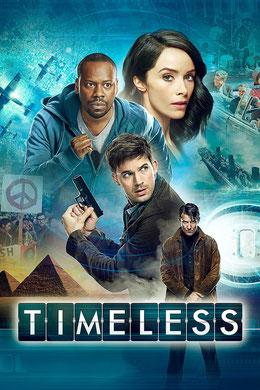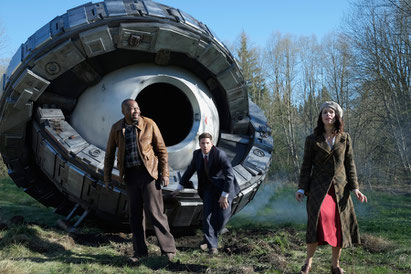
Time Travel as a concept for TV shows seems red hot right now. As of this writing, there's Timeless, Travelers and Frequency on air - with Time After Time on the way for the new year. Not to mention third seasons of both 12 Monkeys and Outlander have already been greenlit. And Doctor Who has been around forever with no end in sight. Wow, that's a lot of time travel stories and a lot of PVR recordings to set up, or streaming services to search through.
What all time travel tv shows (and movies) have in common is some sort of machine that will send the traveler(s) back. Yes, there are exceptions like The Time Traveler's Wife, or About Time (both incidentally, Rachel McAdams movies), where the act of time traveling just sort of 'happens'. Usually however, there is a physical device responsible for the journey through time. But as you're probably finding out - especially if you're watching these new shows, once that's determined, there's little else in the way of explanation...

Take NBC's Timeless. In this one hour drama, a history professor, a scientist and a soldier try to stop a criminal who is desperate to change past events (for reasons unknown), including changing the outcome of that fateful day in Dallas, or the Alamo. The criminal uses one time machine, while our heroes use another (an earlier prototype that works surprisingly well), to chase him. Thing is, we're told very little about how the actual time travel machine works. Nothing, in fact, except that the users of the machine can't visit the same time and place twice. Oh...and that the machine comfortably sits three and has room for a first aid kit and a minibar (I haven't actually seen the minibar but I'd put one in there). With some splashy special effects thrown in when the time machine operates, that's about all we get.
Thing is...is an explanation necessary? Time travel as a plot device helps to move these stories forward. I suspect that the creators and producers realize that they don't need to bother with an actual explanation of how time travel is possible - because how would you prove or disprove it anyway? And do they really need to explain it anyway, because the technology is not what the show is about?

I say yes, explain it. I, for one, would like to know how time travel is possible in the context of the story (of course I understand that these are in fact stories...but give us something to work with here!). Let me explain why with an example. In Timeless, history is always changed in every episode. When Lucy Preston, our heroine, returns to present day from her first mission in 1937, she finds a number of differences. Her sister no longer exists (was never born, in fact). Her mother's cancer is gone. And she has a different fiance than the one she remembers. In fact, she doesn't know this (new) guy at all. The person she knows as her real finance has never met her. Nobody else knows or remembers that anything has changed. They don't, because aside from her two time traveling colleagues, this is the history they grew up with. Which begs the question - if time has changed, would not have the original mission?
Knowing how the time machine operates in the context of the story, or even just how time operates, could help us better understand the storylines. For instance, with Timeless, why can't we go back to the same place twice and set things right? Oh right. Because one of the scientists says you can't, end of story. That's too bad, because going back to the same place again, if done right, could make for a great episode.
I like Timeless. I didn't at first, but it's growing on me and I feel it has a lot of potential. You root for the characters but you're also curious about the villain's motivation. They've written it well. Here's hoping we get to the bottom of the "Rittenhouse" conspiracy without waiting three seasons. The show currently scores 86% on the "tomatometer" on Rotten Tomatoes.
Incidentally, if you're curious about how changing one event decades ago changes things in present day, check out my theory in my blog on why A Time Traveler has a lot more to worry about than the Grandfather Paradox.
Write a comment
Hartley Schaub (Friday, 05 October 2018 12:40)
According to Wiki, the idea of a time machine was popularized by H. G. Wells' 1895 novel The Time Machine. I am about to read it, but first to open up a little time in my schedule, I'll use my personal time machine, purchased on Amazon for $69.95, to reverse back, say just a week (I have modest goals). ;-)
So I agree with your statement. Knowing just how the magic works helps suspend your disbelief, and I am no quantum physicist, but most peeps of average intelligence can usually pick apart the loop holes and vicious cycle that might happen with time travel tools in any work of fiction. In my statement above - the half hearted attempt to convince you I had a personal time machine fails miserably because our readers here know that Amazon doesn't carry a personal time machine for $69.95 (I think it's actually $5,445,670, but it comes 4 minions and includes a 30 day warranty, hmm - meaning a lifetime when you think about it). Point is - no matter how lame the tool actually is, directors want to waste as little time possible on the boring logic of time travel and get to the human story of redemption, retribution, etc.. In my case, above, I shared an unusual way to read a novel and don't really care if you suspect I lied, because we know already it's impossible at the moment. Rush "got it" and just had fun with time travel for the video of their Time Machine album where they flash back to the bands past via a retro "Gefilter" time machine that is used in the back of an old jewish deli. It's hilarious fun and get's down to business quickly, assuming no rush fan needs to know how it works. Who has time to learn (oops yes, no funny intended) special relativity and general relativity? Let's at least leave the heavy logic behind and get to the fun unless it is essential to the plot development. Having said all that, it does still irk me to see illogical anomalies like the one in Back to the Future where Marty is disappearing in the photograph due to his waning existence in time. When I think too hard how this couldn't be possible, then I simply give up in an enjoy MJ Fox riffing on Chuck Berry's Jonny b good - and laugh. Here is just the first part to the Rush video here: https://www.youtube.com/watch?v=61eu-KyijQE